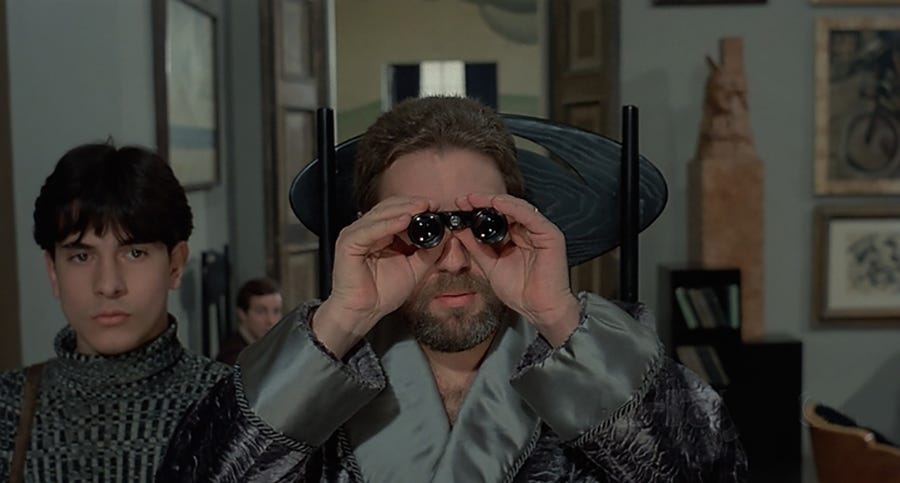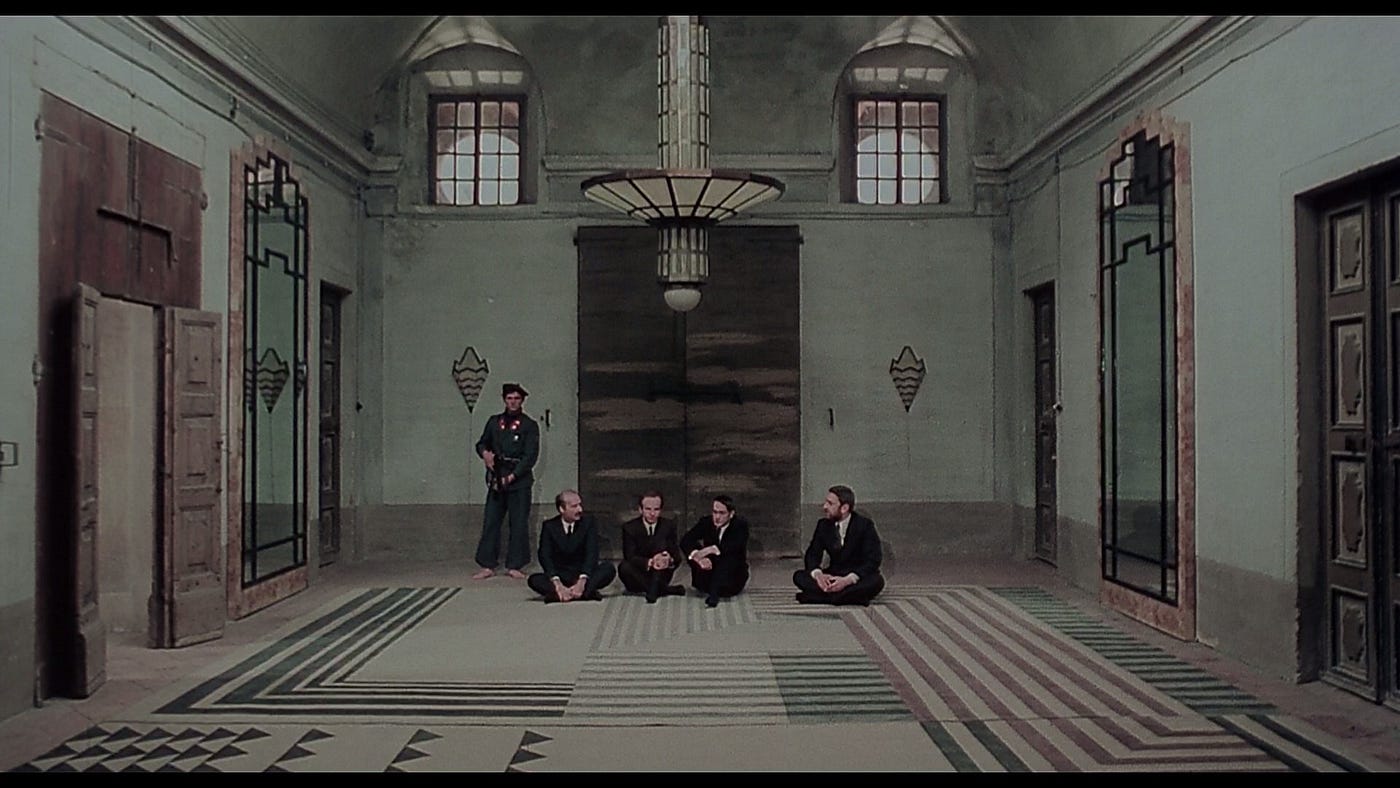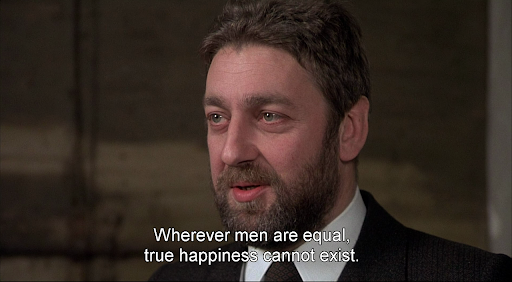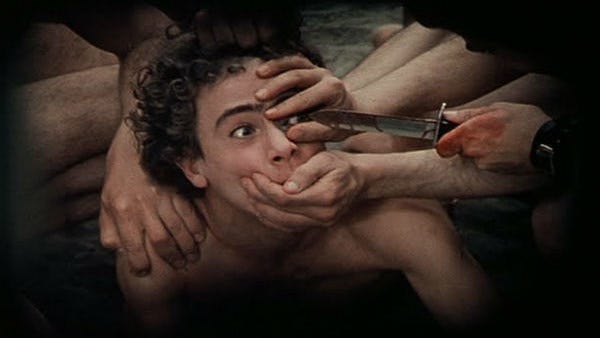Salãƒâ² or the 120 Days of Sodom Review
"Salò, or the 120 Days of Sodom" is the Virtually Disturbing Film of All Time
Fell, explicit, revolting, roughshod, depraved, shocking, horrifying…

Pasolini'due south loosely accommodation of a volume described by its writer equally "the nearly impure tale ever written" might be, almost 45 years later, the most disturbing film of all fourth dimension.
Ante Inferno
Yesterday morning, for the purpose of writing an article almost the most disturbing moving picture I've always seen, I re-watched Salò, or the 120 Days of Sodom (Salò o le 120 giornate di Sodoma, Italy, 1975). It did not disturb me as much every bit when I watched it for the get-go fourth dimension was my outset impression after this second viewing. But equally the solar day went by, I began feeling more and more disturbed, even nauseous. Once again this morning, when thinking well-nigh sitting down to initiate my writing, I felt that disturbance and nausea fifty-fifty stronger than yesterday.
Then I remembered something: that was exactly what happened after my first viewing! After all, this is ane of those movies that the mind needs to process and "digest" starting time before information technology starts to really disturb y'all. The event of disturbance comes during and afterward this digestion process; information technology's non until y'all assimilate the whole thing that your mind starts feeling quite distressed.
I watched Salò for the first time a couple of years ago, afterward deciding to do a school presentation on Italian cinema, which included the mention of Pier Paolo Pasolini's filmography. Mama Roma was a must-lookout man, but so it was Salò. Writing the script for my project made me uncomfortable, and I was more so on the presentation day. Whatever imagery of anything related to this movie would disturb my heed (even the discussion "Salò"). Life felt every bit if seen through a dark lens. I ended upwards deciding to just vaguely mention the film in my presentation, commenting on it as "the well-nigh disturbing film I've e'er seen in my life" without giving any details near its premise, equally a means to avert the rest of my presentation being ruined by disturbing imagery.
Interestingly, something like happened to me this morning. When thinking about writing this article, I simply didn't want to. I didn't want to spend fourth dimension with that imagery in my head for the period of time that it would have me to write the whole story. A different, safer idea crossed my mind: to make a listicle of the most disturbing films I've seen in club to keep from spending too much time with Salò on my mind, as I could simply but vaguely mention it along with several others films (the same strategy I used for my presentation). Because having multiple disturbing films on my mind (the about disturbing films I've seen) is better than to focus solely on Salò.
What makes Salò so disturbing?
And why is it that the disturbance comes afterwards on rather than during the viewing experience? It occurred to me that the most terrifying aspects of the moving picture do non rely on gore or explicit sequences (which the motion-picture show does have) just rather on the philosophies and beliefs of the protagonists, what these entail, how likely it is that people had stood past them (and if some still exercise), and how reasonable and legitimate these seem to exist. This is a moving-picture show where the horrors — the monsters — are found in the dialogue.
"Abandon hope all ye who enter here"
— Inscription at the gates of Hell in Dante'southward DIVINE One-act
During fascist Italy, in the democracy of Salò, Nazi territory, 4 powerful men, a Duke, a President, a Bishop, and a Magistrate, kidnap 18 teenagers based on the physical attributes they find attractive. These teenagers, 9 immature men and nine young women, are about to feel an inferno by falling casualty to the hands of powerful fascists, who can do with them as they please.
Some of these victims appear to come from wealthy families, equally it is mentioned that the father of one of them is a senior judge like the Magistrate, and autonomously from the xviii teenagers, the fascists marry each other's daughters, who from there become their victims too. "Conservative recoil non from slaughter though victims are son and girl," says the Duke. This makes the premise even scarier; it states that no amount of money, ability, or beauty could save you when faced against real and absolute ability, represented by the four monsters of this horror film. Therefore, in the first part of this film, titled "Dues Inferno," the horror is in the sense of all hope being lost.
An equivalent of Dante'south quote above is that of the speech the Duke gives to the victims when they are brought to the entrance of a palace near Marzabotto, in which the horrors will occur. This introductory spoken communication pretty much surmises the premise of Salò:
"Your herded, feeble creatures, destined for our ain pleasure, don't wait to find here the liberty granted in the outside world. You are beyond the attain of whatsoever "legality." No one knows you are hither. As far as the earth goes, you are already dead. These are the laws which will govern your lives:
At half-dozen p.one thousand., the company will assemble in the 'Hall of Orgies,' where our Storytellers will tell united states stories, each with a particular theme. Our friends accept the right to interrupt at whatever moment. The purpose of the stories is to inflame lust; all will be permitted. After dinner, the gentlemen will deport the so-called orgies. The Great Hall will be adequately heated. Participants, appropriately dressed, volition lie on the floor like animals. They will intermingle, copulate indiscriminately, incestuously, and sodomistically. That will be the daily process … Any man defenseless in flagrante delicto with a woman will be punished by the loss of a limb. The slightest religious human activity past anyone will be punished by decease."
The post-obit thoughts and reflections about what makes the dialogue in Salò so disturbing were not there for me on my starting time sentinel; they were rather subconscious somewhere deep inside my heed, a place I wouldn't dare to explore. On the other hand, my 2d watch made everything clearer because this fourth dimension, I had more context. Information technology's non just the fact that I had already seen the film, or read the book from which it was adjusted: Marquis de Sade's 120 Days of Sodom; information technology was also because I had read On Genealogy of Morality by Nietzsche. Having this in mind, it's not surprising to find in the flick a scene in which the fascist reference the German philosopher.
"The principle of all greatness on Earth has long been bathed in claret … No forgiveness without bloodshed."
— The Magistrate (Salò, or the 120 Days of Sodom)
"The moral conceptual world of 'debt', 'conscience', 'duty', 'sacred duty', has its breeding ground — all began with a thorough and prolonged bloodletting, like the start of all great things on world."
— Friedrich Nietzsche, On Genealogy of Morality (Zur Genealogie der Moral, Germany, 1887)
According to Nietzsche, human being memory is made of promises and contracts, and pain is the best method to create a memory. Memory is made of blood. This does non mean that human beings were cruel and violent with each other to create a memory. No, the reason backside cruelty, says Nietzsche, is that others' suffering produces pleasure in humans. Memory appears and then as a result, merely not that it was created past purpose.
One of the principal premises found in Genealogy of Morality is that morals have its origins in the relation betwixt buyers and sellers, debtors, and creditors. In ancient times, when a debtor couldn't pay their creditor what they owe them, some alternatives were paying with their own body, their life, their freedom, and/or with their ain suffering. That fashion, the right to be cruel to those who cannot pay their debts was created. Creditors would exercise this right of cruelty because this produced a do good for them in which the debt could be sealed: the benefit of the pleasure that beingness cruel produces. Afterward existence punished by the hands of their creditors, debtors could then be forgiven; hence "without bloodshed, there is no forgiveness."
At first sight, one might interpret the scene in which the fascists quote Nietzsche every bit them looking to justify their cruel acts. When watching movies that draw cruelty, nosotros might attempt to await for justifications and so that they provide united states of america with some relief, something that gives suffering a meaning (because meaningless pain is much worse).
Take Jigsaw (Saw, U.s., 2004), whose torture games intended to make his victims appreciate life; or the cult members in Martyrs (France, 2008), who torture women in search for transcendence; in other movies, torture is done for interrogation purposes (El Laberinto del Fauno, Espana, 2006); sometimes a graphic symbol is cruel to some villain that was only every bit cruel equally a grade of revenge or "justice" (I Spit on Your Grave, USA, 1978). Fifty-fifty in cases where a character is vicious for plainly no legitimate reason or for simple pleasance, a justification might be in the form of a villain who's mentally ill and irrational (The Texas Chain Saw Massacre, USA, 1974), or not even human being (It, Us, 2017).
However, a lot of thought, logic, and reason went into a book such as On the Genealogy of Morality, a book that, under its own logic, "makes sense." The ramifications that this can produce in our minds make this film, nether this philosophical context, the nigh disturbing film of all time.
But if nevertheless, we were to interpret the scene equally a justification for cruelty, at that place's something that doesn't fit: the victims didn't do anything! They don't owe them annihilation, at that place is no debt to be sealed, no forgiveness to be granted! It turns out that these fascists don't need a justification to obtain the "correct" to be cruel; they take this right only because they are who they are. Their malice is disinterested, something that tends to be the primary trait for the evilest characters we can imagine, and the fact that Nietzsche is being referenced in Salò makes the evilness of these four libertines scarier, given that Nietzsche, in the same book, referred to this disinterested malice as "a normal propriety of man."

"We fascists are the just truthful anarchists. Naturally… once we become masters of the land, truthful anarchy is that of power."
— The Duke (Salò)
There is no scariest monster than 1 who is above authority, one who operates from impunity and for self-pleasure. In the moving-picture show's opening scene, the Bishop says, "all things are neat when taken on excess," which is the contrary of "excess of annihilation is bad." Those of u.s. who abide by the famous old prober might do so considering we alive in a lodge that condemns excesses in a way that if we participate in such, nosotros could potentially receive some kind of penalization.
True anarchists, the masters of the state, would exist the exception to this rule. They are at the zenith of power; it doesn't get much higher than that. When a human being reaches that indicate, what comes next? We find the answer in the things that the four monsters in Salò have committed their beingness to: hedonism and immoderacy to the extreme, the fine art of enjoying life, as opposed to what the common people dedicate their lives to, which is working to, hopefully, reach a point in which there is zilch else left than to savour the remainder of life.
These four fascists planned this out. They, experts on experiencing pleasure, organized this in such a way that information technology will maximize it.
"Cypher is more contagious than evil," says the Magistrate. This parts from the aforementioned idea that disinterest malice is not just normal propriety of man but something that humans greatly enjoys. Only the Knuckles corrects the Magistrate:
"You are mistaken, Your Excellency. Some can do evil but when passion drives them to it. They are always unhappy, regretting the evils of the previous night."
— The Duke (Salò)
Not everybody is "potent" plenty to do evil, and even when they do, they will later feel guilty. This is due to the feeling of guilt, or "bad conscience," which exists (so we hope) in the majority of human beings today. This bad conscience was built-in as a product of social obligations, sustained past violence and cruel punishments. However, these social obligations were not created by contracts; they were rather imposed by force by the "strongest" men. This is how the state was created: by strength, cruelty, and blood. With their master morality, the aristocrats did non have this sense of guilt, this bad conscience, because, having absolute power, they were never punished for their actions! Therefore, they could enjoy a lifetime of pleasure and excesses, the freedom to be led by human'south animalistic instincts, which include violence, cruelty, and all sort of mania.
"You lot know, I respect all tastes and whims. Notwithstanding baroque, all deserve to be respected. Because we are non their masters, even the well-nigh baroque manias derive from a basic principle of effeminateness."
— The Bishop (Salò)
These libertines do not look at their manias equally depravities; instead, they consider them delicacies, refinements. The reason for this could be that their morals are probable based on Nietzsche's master morality, in which everything that the masters (the aristocrats) exercise is fine and good since they make them happy.
Lacking the feeling of guilt, a main's tastes volition differ massively from those of "the people" who exercise take a bad conscience. From the people's perspective, the master's tastes would be seen as depravations. But for the aristocrats, these tastes, whims, and manias correspond their power and nobility, which distinguish them from the remainder. The "people" are not refined plenty to relish a delicacy similar, for instance, human feces.
Circle of Shit
In the film'due south segment titled "Circle of Shit," both the fascist and the victims eat zilch but human excrement for several days. This is obviously torture for the victims, just the fascists are simply enjoying a effeminateness, and this distinction marks the divergence in their status.
On Genealogy of Morals also touches on how the bad witting (enhanced by the birth of the ascetic ideals and faith) made humans feel disgusted with their ain nature, their animalistic instincts, their own body, and its fluids. According to Nietzsche, the reason we feel disgusted past things such as our own urine and excrements is that our bad conscience makes united states feel ashamed of ourselves, with our own animalistic nature. The fascists in Salò not just do not feel disgusted by these; to the reverse, they like information technology, and they likewise swallow it. The more hideous the feces are (for united states of america at least, for "the people"), the more exquisite they are for them. Information technology is a privilege to be able to enjoy something that near can't.
"It's folly to say 1 owes anything to one's female parent. Must we be grateful for having pleasure with a man? That should have been enough advantage for her."
— The Duke (Salò)
Signora Maggi, one of the Storytellers and a prostitute, tells a story in which she wanted to visit a customer who was "notorious for his depravity," something that produced in her an immense curiosity. Signora's female parent pleaded her not to become, and Signora, who "couldn't resist the temptation," killed her. The Duke and then comments: "that was the just matter to practise. The excitement pending you was supreme meriting the utmost sacrifice…" so he reveals that he killed his own female parent also. After hearing this, Renata, a daughter who had lost her mother later on she was killed trying to protect her when she was being kidnaped, breaks down in tears.
When watching this scene, earlier it was revealed the reason why the daughter cries, I thought (even on my second lookout man) that she was crying out of terror after realizing that her kidnappers are worst that she could've thought. If she had a drop of hope that they would be merciful, this must've vanished at that moment. Simply she does beg for mercy right afterwards, albeit the mercy of death. "Don't call up your tears restrain my desire; they brand me more than ruthless," is the response she gets.

"It is when I run into others degraded that I rejoice knowing that it is better to be me than the scum of 'the people.' Whenever men are equal, without that difference, happiness cannot exist … no voluptuousness flatters the senses more than social privilege."
— The Duke (Salò)
The difference between the Duke and Renata is that the Duke is a real aristocrat, 1 that lacks a sense of guilt, someone without a bad conscience, someone that nosotros, "the people," would refer to as a "psychopath." The Duke killed his ain mother with no remorse, whereas Renata suffers for the dead of hers. Despite her beingness, in the outside world (the world of "legalities"), likely a daughter in a bourgeoise family, inside of this palace is nothing just "scum" when compared to a real aristocrat like the Duke, who finds her whining and begging to agitate.
Circle of Blood

"To meet suffering does y'all practiced, to make suffer, better still."
-Nietzsche, On Genealogy of Morals
The virtually gruesome and gory scenes come in the last part of the film, titled Circle of Claret. We come across torture without censorship: genitals beingness burned off, one guy getting his natural language cut off, another getting his left middle gouged out, a girl getting scalped… The fascists accept turns to exist both torturers and observers; from a window, they sentry the spectacle with binoculars. If you are sensitive, these scenes can disturb yous, simply more disturbing is to watch two of the fascist'due south soldiers, who collaborated in the tortures, dancing in the last scene of the film.
Pasolini was a dauntless creative person. But the bravest of artists would attempt to brand a film adaptation of such a volume. The manager approached the themes depicted in Salò as a critique against the dehumanizing furnishings of fascism. I can't say the same thing about the author of the book from which this film was adapted. In The 120 of Sodom, Marquis de Sade seems to me (given that he was libertine himself) to be glorifying the themes and philosophies depicted in his book (immensely more disturbing than the movie).
In that location's a scene where one of the fascist's soldiers is caught having sex with a servant. The soldier raises his fist in the air (a Socialist salute) before him and the servant gets shot dead. In such a film, a scene like this constitutes a huge relief. Thank God their expiry was quick and with small-scale pain! Sadly, it adds to the disturbance that Pasolini's wasn't.
benedictrusequithe78.blogspot.com
Source: https://medium.com/cinemania/sal%C3%B2-or-the-120-days-of-sodom-is-the-most-disturbing-film-of-all-time-dabf16e8664f
0 Response to "Salãƒâ² or the 120 Days of Sodom Review"
Post a Comment